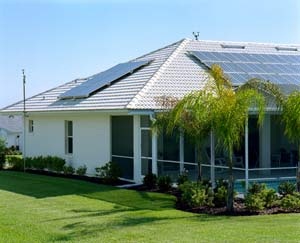FPL solar incentives soaked up in a hurricane of activity
 On Aug. 30, Florida Light & Power Co. (FPL), Florida’s largest utility, was flooded by a hurricane of businesses and homeowners seeking solar rebates. The company reopened its solar incentive program for photovoltaics to the tune of $5 million—it’s gone already.
On Aug. 30, Florida Light & Power Co. (FPL), Florida’s largest utility, was flooded by a hurricane of businesses and homeowners seeking solar rebates. The company reopened its solar incentive program for photovoltaics to the tune of $5 million—it’s gone already.
When the utility first introduced the pilot program in 2011 and took applications on June 29, $5.6 million in funds were fully committed to home and business owners within an hour.
It’s the first year the company, a subsidiary of NextEra Energy, Inc. (NYSE: NEE), offered residential and commercial rebates for solar systems, and demand for photovoltaics has been high.
“I think both the solar business and residential photovoltaic rebates were sold out in a couple hours,” said FPL spokesperson Jackie Anderson.
The website shows that funds for the photovoltaic rebates are already fully committed. However, the company still has $150,000 (as of Aug. 30) in incentives to support solar hot water installations.
In future years, FPL will fund the solar rebate program at a higher level.
“Right now the funding level is at $15.5 million per year,” Anderson said.
FPL currently offers homeowners $2,000 per installed kilowatt, up to $20,000.
“It’s definitely a sizable rebate, and there’s been a great response from our customers as well,” Anderson said.
The equation for businesses wishing to apply for the rebates is a bit more involved, depending on the size of the project, ranging from $2 per watt for installations up to 10 kilowatts in size, to $1 per watt for systems over 25 kilowatts. The business photovoltaic rebate was limited to $150,000, according to Anderson.
FPL reopened the application process because some previous applicants didn’t proceed with their plans.
“That’s why we reopened the application window for the funding. The process was, customers received a reservation for the rebates. Some didn’t follow through. That freed up some funding,” Anderson said.
The company also reevaluated how it allocated the funds.
“Initially, we split funding equally between solar-water heating and solar photovoltaics. Then we reallocated some of it for the second round [based on demand],” Anderson said. “We reallocated some solar water-heating funds to solar PV.”
While of this year’s rebates are now committed to projects, FPL will allow people to start applying for the 2012 incentives in October, according to Anderson.
She anticipates that the process will be like it has been this year.
“I think it will be a natural progression. So we’ll do the initial application and then reopen it again in a couple months to do any additional funding that wasn’t committed the first time,” she said.
Image courtesy of MyFlorida Green Building.



